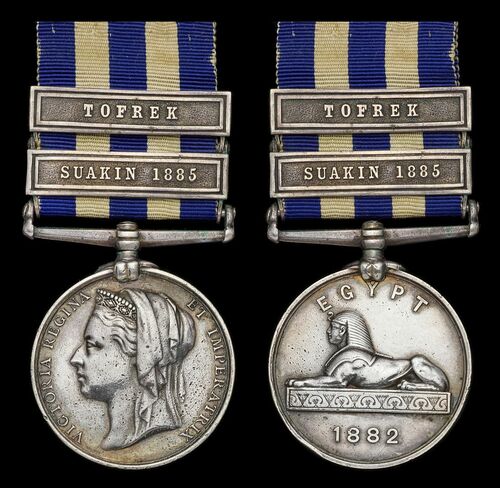
Auction: 24111 - Orders, Decorations and Medals - e-Auction
Lot: 101
Egypt and Sudan 1882-89, dated reverse, 2 clasps, Suakin 1885, Tofrek (41/1692. Sergt. G. Pitman. 1/Berks:R.), official correction to rank, pitting, slight contact wear to regiment, nearly very fine
George Pitman was born at 6 Manley's Buildings, Bedminster Parish, Bristol the son of Lot and Mary Pitman. Attesting with the 41st Brigade at Bristol on 26 June 1879 he was ordered to the 49th Foot at Dover in July and began service with them, being advanced Corporal in May the next year. Receiving his first overseas posting to Gibraltar in March 1881 he was advanced Sergeant there on 15 September.
Ordered to Egypt in July 1882 as part of General Wolseley's army, the Regiment was posted to General Sir Evelyn Wood's Brigade at Kafr-ed-Daur. Here they screened the British beachhead at Alexandria from Egyptian troops and engaged them on several occasions in August 1882. Briefly being posted to Gibraltar they were later to returned to Egypt and from thence to Suakin in 1885.
The regiment was returned to Gibraltar in 1883 but was posted back Egypt on 21 August 1884 and arrived at Suakin on 30 January 1885. Joining General Graham's expedition they were present for the action at Hashin when the British forces cleared out a Dervish camp blocking the route between the Red Sea and the Nile. They were at the forefront of the action on that occasion, storming Dihilbat Hill with losses of just two men seriously wounded.
Having successfully cleared Hashin, Graham sent a force under General McNiell south to set up a supply station at Tofrek as a precursor to advancing on Tamaai, believed to be the Headquarters of Madhist forces in the area. The column arrived safely and began to construct a zariba with half of the Berkshire Regiment stationed in the south-west redoubt of the feature while the other half was to the east cutting brush for the fortifications.
The sudden arrival of a cavalry patrol brought news that a Dervish force was on their heels and almost immediately the column came under attack. The Mahdists stampeded the baggage train and broke an Indian regiment creating such confusion that they were able to force their way into the zariba. Here they began to slaughter the Royal Navy gunners manning the defences, The Berkshires in the redoubt ran to evict the enemy from their defences while to the east the rest of the Regiment formed square and along with the Royal Marines managed to halt the Mahdist advance.
The action was a bloody one with the Berkshire Regiment suffering 23 dead and 29 wounded, had they been overwhelmed entirely it could have proven a serious defeat for the British. Despite the cost General Graham followed up on the surprise victory, burning Tamaai to the ground. Unfortunately, no further gains were made as the Government in London once again refused to commit to the region and withdrew the expedition.
Pitman Transferred to the Army Reserve in September 1885, one month prior to the granting of the 'Royal' title to the Berkshire Regiment in honour of their steadiness during the Battle. He remained with the Reserve until June 1891 when he was discharged. This was not to be the end of his service however as the 1901 census found him in Weston Super Mare as a Police Sergeant.
Pitman remained in Police service transferring to the Somerset police, appearing on the 1911 census as Superintendent of County Police; sold together with copied research including service papers, census data, birth certificate and medal roll.
Subject to 20% VAT on Buyer’s Premium. For more information please view Terms and Conditions for Buyers.
Sold for
£190
Starting price
£110




